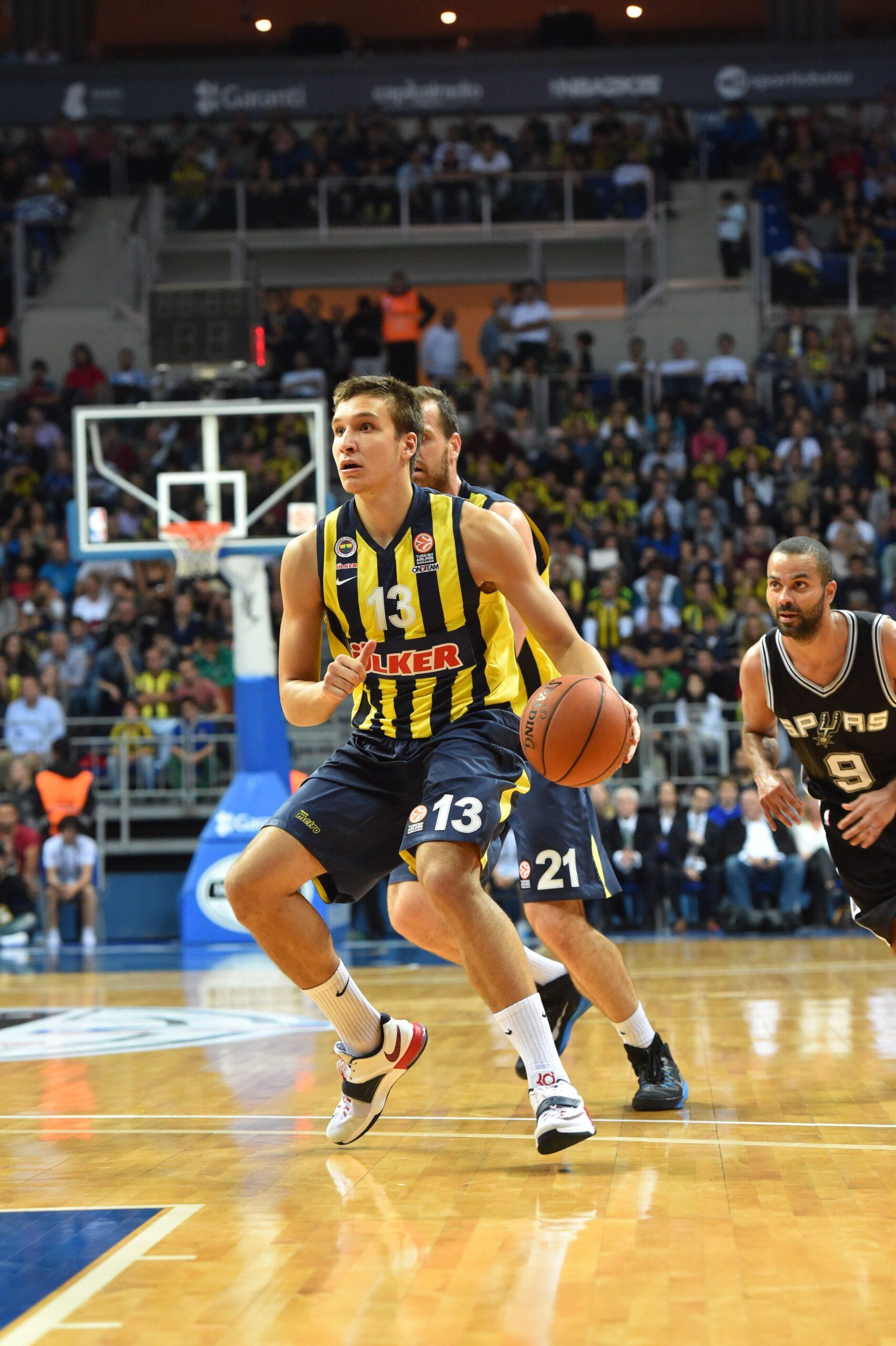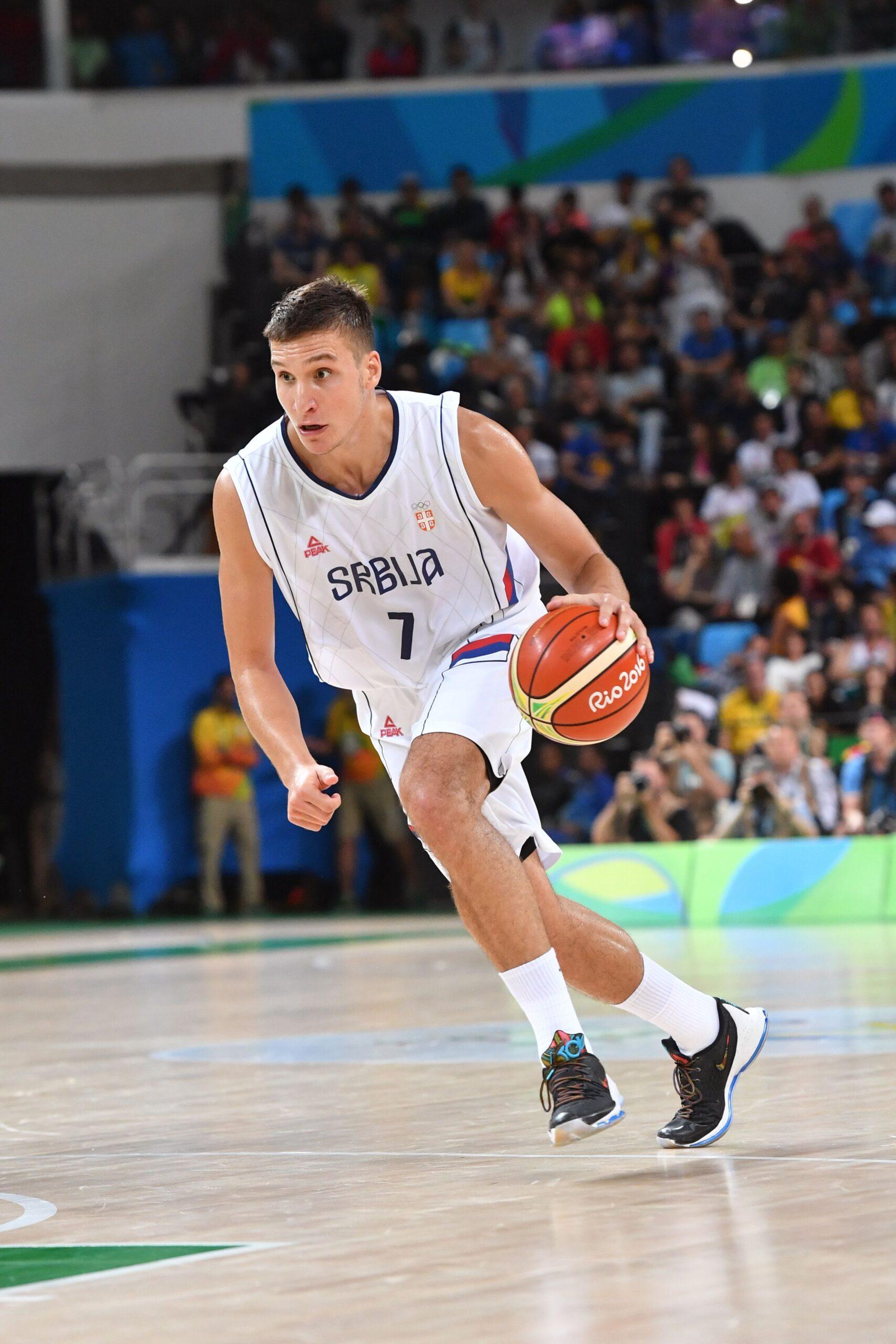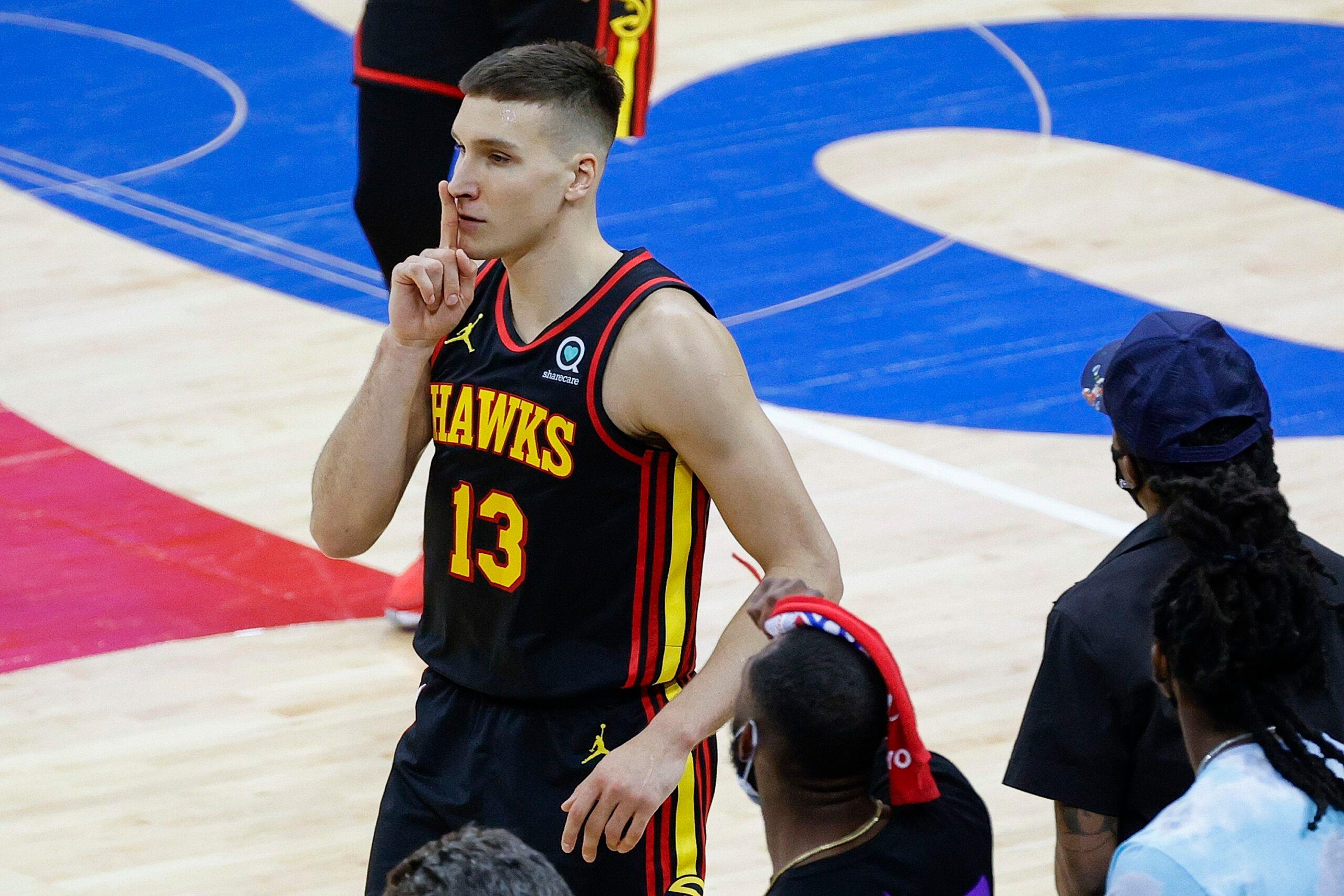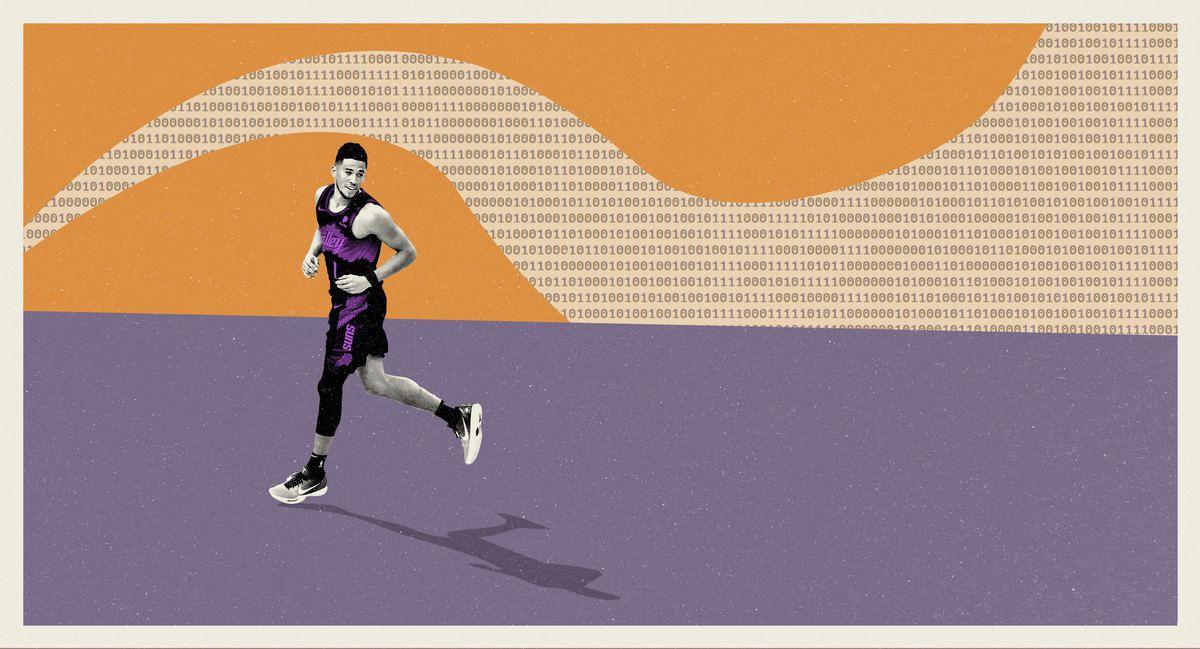Bogdan Bogdanovic will be the first to tell you that he is living two lives. The Serbian national came to the United States in 2017 to play for the Sacramento Kings, but he has not fully surrendered to the pull of American culture. He sees his life as a seesaw, trying to balance his Serbian self with his American one. But that remains an ongoing process, as the differences between the two are marked enough to make Bogdanovic laugh.
In Belgrade, he spends time in outdoor restaurants and cafés by the Danube River, and he doesn’t need much help with his day-to-day responsibilities. After all, people in Serbia don’t schedule coffee for next Friday—only for 15 minutes from now. In the States, though, workouts happen earlier, the caffeine intake declines, and the “hanging out” he’s used to becomes far less common. Bogdanovic grew up putting basketball first, second, and third, but when he arrived in Sacramento, he realized he had to worry about other things, like hiring people to do his taxes and handle his money. It’s all part of a fast-paced American lifestyle that still shocks him, even four years in.
“I feel like people don’t hang out a lot here,” Bogdanovic said in a phone call last month. “Everyone is so fast they don’t have time. Everyone’s in a hurry.”
Each offseason, Bogdanovic returns to Belgrade to conduct offseason training, reconnect with his family and friends, and get a dose of the lifestyle that he misses. But last year, his time there wasn’t as relaxing as usual. Bogdanovic—who was a restricted free agent—didn’t know where he was going to play this season. For a moment, it appeared that the Bucks were going to acquire him. Until they didn’t. Then the Hawks put together a four-year, $72 million offer sheet, and the Kings didn’t match it. Suddenly, Bogdanovic was headed to Atlanta.
“You can’t just let that kind of player go for free, you know?” Nemanja Bjelica, a former teammate of Bogdanovic’s on the Kings and current teammate on the Serbian national team, said in a phone call last week. “But you know, he is now in a better place. It’s better there for him.”

Bjelica and others who followed Bogdanovic’s career before the NBA know that there’s another big difference between Bogdanovic’s life abroad and in the U.S.: his big-game reputation. In 2010, at the Nike International Junior Tournament in Paris, Bogdanovic hit a buzzer-beater to vault his club team, FMP Belgrade, to the finals. In 2014, he averaged 30-plus points a game in a four-game series to help Partizan secure the Serbian League title and to win himself the Finals MVP. In 2016, he hit a buzzer-beater in Fenerbahce’s run to the Turkish Cup, winning another MVP award. And Bogdanovic helped Fenerbahce reach three straight EuroLeague Final Fours, eventually winning it all in 2017.
“Here, he had to perform under pressure all the time,” Fenerbahce general manager Maurizio Gherardini said in a phone call from Italy last week. “But he likes that sort of pressure. … He was not afraid of that kind of responsibility on his shoulders.”
In the NBA, though, Bogdanovic missed out on the playoffs in his three seasons in Sacramento and wasn’t able to develop a similar reputation. That is, until now.
This year, Bogdanovic finished the regular season on a shooting tear (averaging 45.5 percent from 3 since March), and he’s starting to come through for the Hawks in the playoffs. In Game 1 against the Sixers on Sunday, Bogdanovic looked more comfortable than any other player out there as he hit a clutch 3-pointer and shushed the Philly crowd. This may be Bogdanovic’s first postseason, but he already is proving that he belongs. And as one international scout said, “He’s literally built for the playoffs.”
The night Bogdanovic was drafted in 2014, he was mistaken for his longtime friend, Aleksandar Komatina. Gary Harris, who was in the same draft class as Bogdanovic, thought the Suns had taken Komatina with the no. 27 pick and congratulated him instead of Bogdanovic. The two share a vague resemblance, but Bogdanovic thought the mix-up was the funniest thing, and Komatina says he wanted to continue the ruse for the rest of the night.
Komatina has known Bogdanovic since 2008, when the two played on a junior club team together, and the situation reminded him of the high jinks they would pull off in high school, like skipping class to play World of Warcraft. But Komatina also knew how validating that night was for Bogdanovic. “For him, I think it was basketball or nothing,” Komatina said. “He wanted to succeed in basketball at all costs, so he was very serious with his routine and practice at a level which was uncommon for a kid his age.”
The culture surrounding basketball in Serbia is, as one former coach and trainer explained, cutthroat. Most kids grow up wanting to play, so there’s little room for shortcuts or extracurriculars.

“For us, basketball is the no. 1 option, our only option,” Bogdanovic said. Serbian teams “want you fully committed. … There is no thinking about what you’re going to do with your money. You cannot be a basketball player and, let’s say, rapper or businessman over there. You’re only a basketball player. If you want to do something else, do something else, but don’t fuck with the game.”
What defined Bogdanovic’s rise, and what made him stand out in a country full of aspiring players, was his presence in the gym. His commitment to practicing and putting in the work is something of legend in Serbia. Former teammates like Joffrey Lauvergne say he was known for bookending a late night out with a training session the following day. “There is no secret with him,” Lauvergne said in a phone call from France last week. “The work ethic is why he is where he is, why he’s improved, why he is at this level.”
Talk to anyone who has been around Bogdanovic and you’ll hear a lot of the same praises, both of him as a player and a person: He’s always smiling, he’s always positive, and he’s always trying to get better, no matter the circumstances. One assistant coach with the Serbian national team, who asked to not be identified, says that one of his favorite things to do is to give Bogdanovic a laptop with film of a game they just played and watch him study his tape. Bogdanovic is eager to share his findings with other players and work them into live play.
“He’s like one of these really wired and driven guys that’s simplified his life to mostly basketball,” the coach said. “He’s actually more driven like a U.S. guy in terms of being in a gym all the time, than your traditional European guy. … He’s obsessed with it.”
Playing for one of the biggest clubs in Europe, with every game counting toward some tournament, title, or cup, there was never a lack of pressure on Bogdanovic. And his level of commitment resonated with those who saw him daily. Gherardini describes Bogdanovic as a “workaholic, but in a good way.”
During the four years Bogdanovic spent at Fenerbahce under Zeljko Obradovic—one of the most decorated coaches in Europe—Gherardini saw the evolution of the guard from just a shooter to a dynamic player with the potential to excel on and off the ball. “The one major quality he had is what I would call an unlimited determination to get better,” Gherardini said. “He knew that he was athletic, but not super athletic. Quick, but not super quick. So he knew his game had to be run to perfection in order to be extremely efficient at the best possible level. So he recognizes his limits, but he never gives up trying to go above these limits.”
Bogdanovic does not lack experience when it comes to quieting crowds. While playing against Maccabi Tel Aviv during the 2015 EuroLeague playoffs, Bogdanovic hit a big 3 during the third quarter and proceeded to raise his finger to his lips. So it was no surprise that after Bogdanovic buried the clutch 3 that would clinch the first game of the Hawks’ series against the Sixers on Sunday, he did the same.
For those who had seen Bogdanovic play in Europe, the shot was expected—even if the moment felt a few seasons overdue. “I have to say, it was weird not seeing Bogdan compete in the playoffs for three years,” Komatina said. “Because that is his default environment—competing for the title. … I think in those moments, he plays best.”
That play was both a statement of intent, showing the Sixers and the league at large what he’s capable of, and also an exclamation point on a challenging season. Before Bogdanovic had played a single game with the Hawks this year, he contracted COVID-19 during training camp. He had to quarantine in a hotel room for two weeks, since he hadn’t found an apartment in Atlanta yet. And once he returned to the court, he noticed something wasn’t fully right with his breathing.
Eventually he heard Jayson Tatum speak about needing an inhaler three months after contracting the virus, and he felt seen. “I felt the same way at the beginning, like I needed something for my chest,” Bogdanovic said. “My lungs were not like before.”
Bogdanovic eventually fully recovered from COVID, but just nine games into the season, he suffered an avulsion fracture in his right knee. During the 25 games he missed, Bogdanovic focused on his recovery, still getting up shots even if he had to do it while sitting in a chair or from a stationary standing position. And he also used that time to improve other aspects of his life. He realized he hadn’t been eating as well as he could be, and that the stress of this season, as well as the early-morning COVID testing, had made sleep difficult. So he switched up his diet to maintain his playing shape and started taking melatonin to get a good night’s sleep. His recovery was faster than expected, and he was back on the court within two months.
“He doesn’t like it, but I always tell him he’s the ultimate professional because he always gets his body ready,” said Hawks teammate Clint Capela. “He comes one day before [the game], off days, everything. He’s always in, getting massages, getting his treatment in the weight room, shots up. … I love the way he’s getting into the game, and the success is not random. The way he’s making shots, to me, it’s not random. He’s out here every day, doing the work.”
The timing of Bogdanovic’s return to the court coincided with the Hawks’ coaching change from Lloyd Pierce to Nate McMillan, and the team started producing immediate results. McMillan used Bogdanovic both on and off the ball more, and the increased opportunities unleashed the guard and allowed Trae Young to rely on Bogdanovic as a ball handler, too.
“I think having another guy out there that can really find ways to score and create off the bounce and get everybody involved, I think it’s very important,” Young said. “I think it was a good adjustment for us.”
“We personalized our offense a little bit more to get him the ball, move him around,” McMillan said after a game in April. “He does a great job of moving off the ball, coming off screens, so we’ve added a few more sets to feature Bogi in those situations.”
By the time the regular season wrapped, Bogdanovic had put together one of the best shooting performances of his career. In 44 games, he averaged 43.8 percent from 3 on 7.6 attempts—both career highs. His effective field goal percentage was over 60 percent, and he averaged a career-high 16.4 points per game. More importantly, Atlanta made it to the playoffs—and Bogdanovic played a crucial role in making that happen.
Bogdanovic didn’t see just a shift in his game when McMillan took over, but also a cultural one within the team. Sure, McMillan wanted them to have fun and have freedom on the court, but he also ran a tighter ship—something that reminded Bogdanovic of his coaches back in Europe—and pushed him to perform at a higher level. The chemistry that he and the rest of the Hawks have been able to build this season has pleased Bogdanovic, and he says it’s helped him grow as a player.
“When you’re going by yourself, it’s super hard and it can only get harder,” Bogdanovic said. “You can work as much as you want, as much as you can, but if you’re going by yourself, it’s hard. If you have a team that works like this one, then it’s easier.”

It’s no coincidence that when Bogdanovic returns to Belgrade each offseason for training, he focuses on the details. As those who have been around him can attest, his affinity for players like Kobe Bryant and Michael Jordan has shaped both his on-court approach and his goals.
“Basketball at this point is about the details,” Bogdanovic says. “‘Why am I missing when I’m coming over the right-side curl or left side? What is my weakness there?’ So I watch the tape, I change the footwork, I add a little bit more strength to that leg.”
“I think growing up and idolizing Kobe left a positive mark on his sports mentality,” Komatina said. “To the point of obsession with overcoming obstacles and trying to be the best version of himself.”
If Bryant and Jordan were his models to imitate, then it’s no surprise that Bogdanovic is relishing the chance to show what he can do in an NBA postseason. After all, that preparation and obsession has helped him find success in plenty of other big games.
Gherardini remembers waking up early the morning before Fenerbahce’s 2017 EuroLeague series at Panathinaikos began only to find Bogdanovic sitting in the breakfast room going over a game that hadn’t happened yet. “I said, ‘What are you doing here?’” Gherardini said. “He said, ‘I am thinking about the game. I’ve been thinking about the game, reviewing the game in my head, that’s why I wasn’t sleeping much.’” Whatever Bogdanovic was reviewing worked. He helped Fenerbahce upset Panathinaikos 3-0 in the series, and they went on to win the EuroLeague title for the first time.
The Hawks may not be title favorites this season, but what both they and Bogdanovic have shown is that they’re no longer a team that can be ignored. This roster has plenty of potential and room for growth—as well as a player who’ll do whatever it takes to play, and succeed, in high-pressure moments.
“Every year, he just got better,” Bjelica said of Bogdanovic. “He loves the game of basketball, and his work ethic is amazing. He’s showing right now he doesn’t just belong in the league—he can win.”
